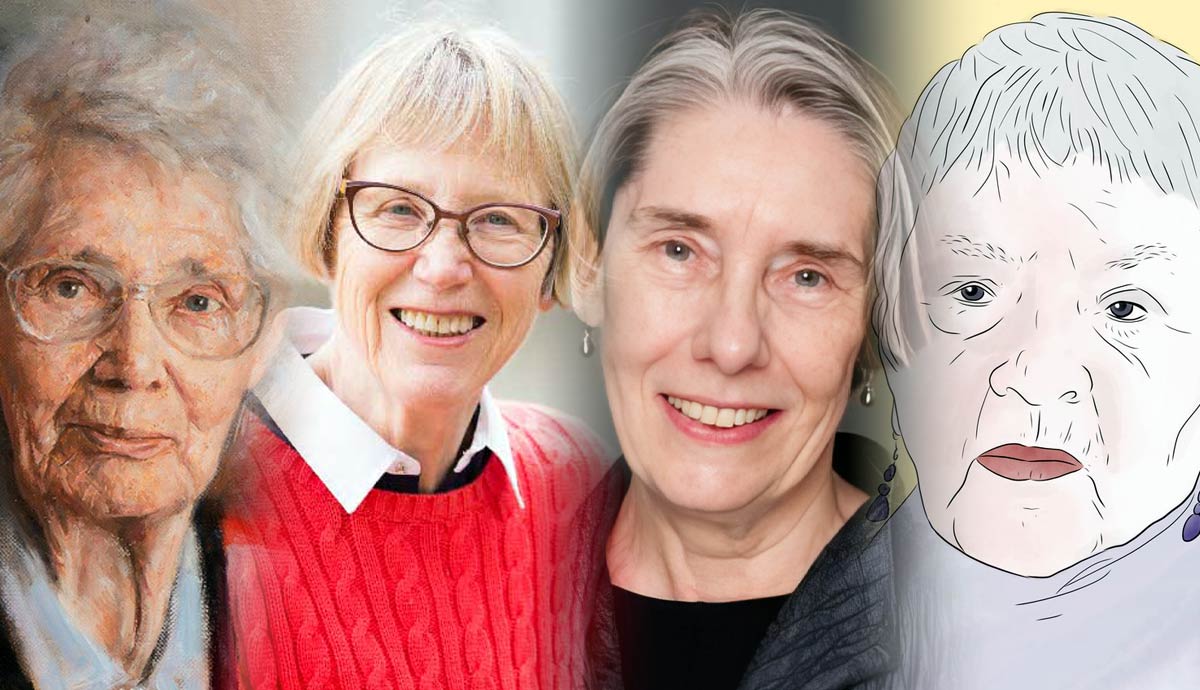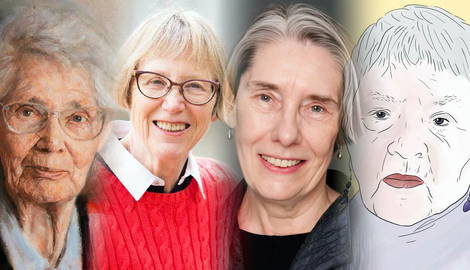
It takes courage and competence to excel in a field that connects two knowledge domains traditionally reserved for men—philosophy and science. Not only did they have to navigate the challenges of the field, but they were also up against concerns such as misogyny and harassment. Learn about the contributions of some of these renowned women who were uncovering conceptual foundations of methodology in both natural and social sciences while breaking social barriers and gender norms.
Women in the Philosophy of Science

Although it may seem that philosophers engaged actively with science in the 20th century, the roots tying the two together run even deeper. The men behind early modern science called themselves “natural philosophers” or “experimental philosophers.”
This labeling persisted as late as the 19th century, as evidenced by Michael Faraday’s lectures, where he referred to himself and his colleagues as experimental philosophers. However, what is usually considered the “philosophy of science” originated within the analytic tradition and Vienna circle and was marked by prominent figures like Karl Popper, Hans Reichenbach, Thomas Kuhn, Imre Lakatos, and many others. Their goals were either normative–to set standards for scientific methodology or descriptive–to describe scientific practice.
Nonetheless, the 20th century saw important female philosophers of science whose contributions were usually not celebrated as much as they should be. The list that will be presented in the rest of the text is not exhaustive. Rather, each philosopher is chosen with respect to the novelty she brought up in the field.
1. Mary Hesse

Mary Hesse (1924-2016) was one of the pioneers in the mid-20th century philosophy of science dominated mainly by men. Back then, all philosophers interested in scientific methodology were scientists by training who found their inner philosopher later in life. This meant that a woman who aspired to be a philosopher of science needed to find ways to have careers within the sciences when they were still expected to be mothers, homemakers, and wives.
This being said, you can get a slight glimpse of what Mary Hesse had to handle: social expectations and post-war narrow-minded academia. She received her BA in mathematics in 1945 and a PhD in electron microscopy in 1948 at Imperial College London. She was a lecturer in mathematics at Royal Holloway Girls’ College and University of Leeds before coming to the dark side in the 1950s when her inner philosopher woke up from the dogmatic slumber.
She taught history and philosophy of science at the University of Cambridge until her retirement. When she arrived at Cambridge, she was the youngest teaching staff and the only woman among hired philosophers.
Hesse’s Published Works

Mary Hesse’s main contribution was to introduce the history of science into an overwhelmingly formal and ahistorical field like the philosophy of science in the Anglophone world.
In her book Forces and Fields: A Study of Action at a Distance in the History of Physics—published before Kuhn’s famous The Structure of Scientific Revolutions—Hesse analyzed the relationship between practice and theory in physics, emphasizing that there is no sharp distinction between observational and theoretical terms that was believed to be essential for developing a theory or hypothesis within the formal philosophy of science. Nonetheless, the first significant work within the formal philosophy of science is usually attributed to Kuhn’s historical escapades.
Paying attention to the history and actual practice of doing science allowed Hesse to put models and analogies at the forefront of scientific endeavor. Models and analogies are always conveyed in a particular language and, therefore, have local application despite scientists’ ambition that their contributions have rational ground and universal applicability. Hesse was, thus, among the first Anglophone philosophers who lent an ear to social aspects of science as well. One of her students, David Bloor, became one of the most famous sociologists of science.
2. Nancy Cartwright

Nancy Cartwright (b. 1944) is a philosopher of science who tackled metaphysically and epistemologically loaded notions—such as laws of nature, causation, and objectivity—and transformed our understanding of them through the analysis of scientific practice.
She earned her BS in mathematics from the University of Pittsburgh and her PhD in philosophy at the University of Illinois in Chicago. After teaching philosophy at the University of Maryland, Stanford, and the London School of Economics, she currently holds positions at the University of California at San Diego and the University of Durham. Cartwright has been awarded the Hypatia European Science Prize, the Hempel Award for lifetime achievement, and the Martin R Lebowitz Prize for philosophical achievement and contribution.
Cartwright’s versatility is shown in the wide array of topics she covers in the philosophy of science. Having left her mark on the philosophy of natural sciences, especially physics, she turned to the philosophy of social sciences, most notably economics and evidence-based policy. Her first book, How the Laws of Physics Lie (1983), made a fuss in the philosophical community where the image of universally and directly applicable laws of nature was a legacy of the 17th-century Scientific Revolution.
Cartwright claimed that laws are essentially abstract principles that describe interactions of idealized objects within models but are far from true descriptions of reality. She went on to argue that we ought to pay attention to what physicists are actually doing in their labs. She believes they are testing localized causal claims about concrete physical processes and objects. This further prompted her to see natural laws as capacities or patchworks for organizing dapple nature. Economics represented a true testbed for Cartwright’s philosophical takes on laws and causality since it is a scientific discipline that purports to be predictive and inform policymaking, usually by ignoring the complexities of actual economic systems.
3. Heather Douglas

Heather Douglas challenged the value-free ideal of science that has existed since the 17th century and was reinforced within the analytic tradition and Vienna Circle in the 20th century. Yes, we have a rebel here, ladies and gentlemen.
Douglas earned her PhD at the University of Pittsburgh, one of the US’s most important hubs for history and philosophy of science. Afterward, she held many teaching positions, like the Waterloo Chair in Science and Society at the University of Waterloo, until she settled at Michigan State University.
Douglas is among the pioneers in the Anglophone world who advocated for a socially responsible and engaged philosophy of science. She has written on a plethora of topics, such as the nature of scientists’ responsibility for their research. She has also covered the role of ethical, political, and social values in shaping scientific research, science communication, and science policy in democratic societies.
In her book Science, Policy, and the Value-Free Ideal (2009), Douglas argues that science is—like all human endeavors—heavily value-laden and should be. Isolated science and scientists enclosed in their academic ivory towers are useless to society.
Despite our fears that the mess of intertwined ethical and social values might jeopardize the reliability of scientific inquiry, Douglas thinks that science still may maintain integrity because values help us trace scientists’ decisions and thus make them democratically accountable. Take, for instance, environmental risk assessments of technology and scientific outputs. Science policy, in the form of funding allocation and scientific advising, should consider the social and ethical values that guide scientists in producing specific outputs or technologies, particularly those that could impact society’s environmental well-being.
4. Sandra Harding

Sandra Harding (b. 1935) has made her mark in academic circles by advocating for feminist epistemology and feminist empiricism. She received her BA in 1956 at Rutgers University and PhD in 1973 at New York University. She is currently a Distinguished Professor Emerita at UCLA and a Distinguished Affiliate Professor at Michigan State University. Harding has also served as a consultant for the U.N. Commission on Science and Technology for Development, the Pan American Health Organization, UNESCO, and the U.N. Development Fund for Women.
For Harding, emphasizing scientific objectivity is a clear instance of the androcentric bias. In other words, male scientists insist that their inquiry is objective, value-free, and, therefore, exact, whereas this is far from true. Strong objectivity would also have to include a female standpoint to avoid bias. Alas, this was not the case for much of our history. In her book The Science Question in Feminism (1986), she traces how the traditional scientific method was dressed in gender biases and even rape and torture metaphors.
Harding expanded her analysis of the scientific method in her later works through post-colonial studies. Her main target of criticism was prioritizing the Western perspective and institutions over others, particularly those from the Global South. She claimed that scientists’ particular life experiences will always influence their research, which calls for the voices of marginalized and oppressed ones to be heard.
5. Allison Wylie

Alison Wylie (b. 1954) holds a special place in the philosophy of science because of her extensive fieldwork and mission to decolonize archeology. Wylie received her BA in 1976 at Mount Allison University and pursued both an MA in anthropology and a PhD in philosophy at the State University of New York at Binghamton. She is currently a professor at the University of British Columbia, where she is a member of the steering committee for the project Materializing Indigenous Histories.
Wylie was named Distinguished Woman Philosopher of the Year by the Society for Women in Philosophy in 2013. She has also been recognized in the archeological community—in 1995, she received a Presidential Recognition Award from the Society for American Archaeology and co-chaired the Society’s committee on research ethics in archeology.
The question that has perplexed Wylie from the onset of her career is how historical scientists establish credible claims about the past. Wylie wanted to understand evidential reasoning in historical sciences and develop a model of such reasoning that would give credit to background knowledge, which plays an important role in stabilizing our knowledge of the past. She did precisely that in the co-authored book with archeologist Bob Chapman, Evidential Reasoning in Archaeology (2016).
One of the esteemed ladies who rejected the value-free ideal of science, Wylie also strived to develop ethical guidelines for archeological fieldwork by emphasizing the importance of accountable and collaborative research practice that integrates epistemic analysis with ethical and social values. She was concerned with the cultural appropriation of indigenous heritage she witnessed during her fieldwork. For years, Wylie wrote about equity issues in academia and devoted a special issue of the journal Hypatia, for which she was a senior editor, to questions of exclusion and epistemic injustice towards female philosophers and archeologists.










